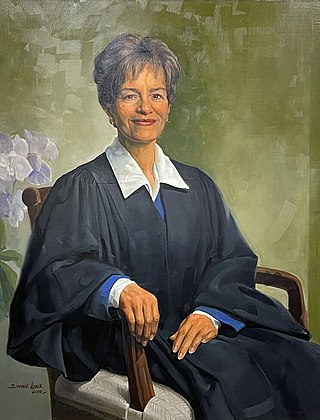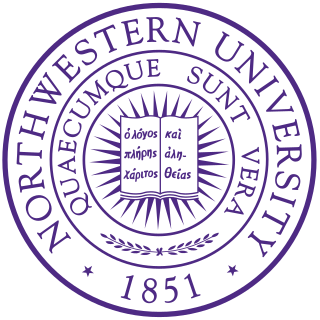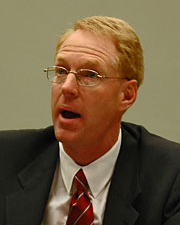Related Research Articles
Gideon v. Wainwright, 372 U.S. 335 (1963), was a landmark U.S. Supreme Court decision in which the Court ruled that the Sixth Amendment of the U.S. Constitution requires U.S. states to provide attorneys to criminal defendants who are unable to afford their own. The case extended the right to counsel, which had been found under the Fifth and Sixth Amendments to impose requirements on the federal government, by imposing those requirements upon the states as well.

Stanford Law School (SLS) is the law school of Stanford University, a private research university near Palo Alto, California. Established in 1893, Stanford Law had an acceptance rate of 6.28% in 2021, the second-lowest of any law school in the country. Paul Brest currently serves as Interim Dean.
A public defender is a lawyer appointed to represent people who otherwise cannot reasonably afford to hire a lawyer to defend themselves in a trial. Several countries provide people with public defenders, including the UK, Belgium, Hungary and Singapore, and some states of Australia. Brazil is the only country in which an office of government-paid lawyers with the specific purpose of providing full legal assistance and representation to the needy free of charge is established in the constitution. The Sixth Amendment to the US Constitution, as interpreted by the Supreme Court, requires the US government to provide legal counsel to indigent defendants in criminal cases. Public defenders in the United States are lawyers employed by or under contract with county, state or federal governments.
Operation Greylord was an investigation conducted jointly by the Federal Bureau of Investigation, the IRS Criminal Investigation Division, the U.S. Postal Inspection Service, the Chicago Police Department Internal Affairs Division and the Illinois State Police into corruption in the judiciary of Cook County, Illinois. The FBI named the investigation "Operation Greylord" after the curly wigs worn by British judges.

Judith Ann Wilson Rogers is a senior United States circuit judge of the United States Court of Appeals for the District of Columbia Circuit.
In criminal law, the right to counsel means a defendant has a legal right to have the assistance of counsel and, if the defendant cannot afford a lawyer, requires that the government appoint one or pay the defendant's legal expenses. The right to counsel is generally regarded as a constituent of the right to a fair trial. Historically, however, not all countries have always recognized the right to counsel. The right is often included in national constitutions. Of the 194 constitutions currently in force, 153 have language to this effect.

Northwestern University Pritzker School of Law is the law school of Northwestern University, a private research university. The law school is located on the university's Chicago campus. Northwestern Law is considered part of the T14, an unofficial designation in the legal community as the best 14 law schools in the United States.
The Hofstra Law Review, an entirely student run organization, is the flagship law review of the Hofstra University School of Law. As of 2021, Hofstra Law Review ranks 68 out of 330 flagship law reviews by the influential Washington and Lee Law Review ranking. Its inaugural issue was published in 1973. The Hofstra Law Review is published quarterly.

Thomas Lee Ambro is a Senior United States circuit judge of the United States Court of Appeals for the Third Circuit.
A criminal defense lawyer is a lawyer specializing in the defense of individuals and companies charged with criminal activity. Some criminal defense lawyers are privately retained, while others are employed by the various jurisdictions with criminal courts for appointment to represent indigent persons; the latter are generally called public defenders. The terminology is imprecise because each jurisdiction may have different practices with various levels of input from country to country. Some jurisdictions use a rotating system of appointments, with judges appointing a private practice attorney or firm for each case.
Pro se legal representation comes from Latin pro se, meaning "for oneself" or "on behalf of themselves" which, in modern law, means to argue on one's own behalf in a legal proceeding, as a defendant or plaintiff in civil cases, or a defendant in criminal cases, rather than have representation from counsel or an attorney.

Richard Joseph Sullivan is an American lawyer who serves as a United States circuit judge of the United States Court of Appeals for the Second Circuit. He was formerly a United States district judge of the United States District Court for the Southern District of New York from 2007 to 2018.

Paul George Cassell is a former United States district judge of the United States District Court for the District of Utah, who is currently the Ronald N. Boyce Presidential Professor of Criminal Law and University Distinguished Professor of Law at the S.J. Quinney College of Law at the University of Utah. He is best known as an expert in, and proponent of, victims' rights.

Virginia Mary Kendall is an American attorney and jurist serving as a United States district judge of the United States District Court for the Northern District of Illinois. President George W. Bush appointed her to the bench on January 3, 2006. In addition to serving on the bench, Judge Kendall is also a noted expert on child exploitation and human trafficking, as well as an adjunct professor and author.

Richard Allen Posner is an American legal scholar who served as a federal appellate judge on the U.S. Court of Appeals for the Seventh Circuit from 1981 to 2017. A senior lecturer at the University of Chicago Law School, Posner was identified by The Journal of Legal Studies as the most-cited legal scholar of the 20th century. As of 2021, he is also the most-cited legal scholar of all time. He is widely considered to be one of the most influential legal scholars in the United States.
Legal aid in the United States is the provision of assistance to people who are unable to afford legal representation and access to the court system in the United States. In the US, legal aid provisions are different for criminal law and civil law. Criminal legal aid with legal representation is guaranteed to defendants under criminal prosecution who cannot afford to hire an attorney. Civil legal aid is not guaranteed under federal law, but is provided by a variety of public interest law firms and community legal clinics for free or at reduced cost. Other forms of civil legal aid are available through federally-funded legal services, pro bono lawyers, and private volunteers.
Philip Elman was an American lawyer at the United States Department of Justice and former member of the Federal Trade Commission (FTC). Elman is best known for writing the government's brief in Brown v. Board of Education. Elman is also notable for being one of just three political independents to have ever served on the FTC.
Judy Clare Clarke is an American criminal defense attorney who has represented several high-profile defendants such as Ted Kaczynski, Eric Rudolph, Dzhokhar Tsarnaev, Joseph Edward Duncan, Zacarias Moussaoui, Jared Lee Loughner, Robert Gregory Bowers, Burford Furrow, Lisa Montgomery and Susan Smith.
People's Law Office (PLO) is a law office in Chicago, Illinois, which focuses on public interest law, representing clients believed to have been the subject of attacks by governmental officials and agencies. It was founded in 1969. Clients have included political activists, people who have been wrongfully arrested and imprisoned, or subjected to excessive force; and criminal defendants.
In the United States, a public defender is a lawyer appointed by the courts and provided by the state or federal governments to represent and advise those who cannot afford to hire a private attorney. Public defenders are full-time attorneys employed by the state or federal governments. The public defender program is one of several types of criminal legal aid in the United States.
References
- 1 2 "Defender Services". uscourts.gov. Retrieved 12 October 2015.
- ↑ Posner, Richard (2010). "What Judges Think of the Quality of Legal Representation". Stanford Law Review. 63– via Chicago Unbound.
- ↑ Posner, Richard A., and Albert H. Yoon. What Judges Think of the Quality of Legal Representation. Stanford Law Review, vol. 63, no. 2, January 2011, p. 317-350.
- ↑ Wilkinson II., J. Harvie (May 2014). "In Defense of American Criminal Justice". Vanderbilt Law Review. 67: 1127.
- ↑ Parsons, Inga L. (1997). "Making It a Federal Case: A Model for Indigent Representation". Annual Survey of American Law. 1997 (3): 837–868. – via HeinOnline.
- ↑ "Overview of Federal Criminal Cases" (PDF). ussc.gov. United States Sentencing Commission. Retrieved 12 October 2015.